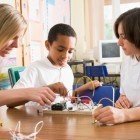"SimCity As game-based learning gains momentum in education circles, teachers increasingly want substantive proof that games are helpful for learning...GlassLab is working with commercial game companies, assessment experts, and those versed in digital classrooms to build SimCityEDU, a downloadable game designed for sixth graders."
Research and publish the best content.
Get Started for FREE
Sign up with Facebook Sign up with X
I don't have a Facebook or a X account
Already have an account: Login
Tech tools that assist all students to be independent learners & teachers to become better teachers
Curated by
Beth Dichter
 Your new post is loading... Your new post is loading...
 Your new post is loading... Your new post is loading...
|
|











When you ask a middle school student what computers are good for they often reply "playing games." SimCity is going to be releasing a SimCity EDU version in the fall of this year. This new version "grew out of research conducted by the MacArthur foundation on how gaming can mirror formative assessments [PDF] – measuring understanding regularly along the learning path, rather than occasionally or at the end of a unit, as is most common. Their research found that games gather data about the player as he or she makes choices within the game, affecting the outcome. In games, players “level-up,” moving on to higher levels when they’ve mastered the necessary skills; similarly teachers scaffold lessons to deepen understanding as a student grasps the easier concepts."
The post also notes that there are those who question if assessment belongs in games. That is a topic that will continued to be debated.